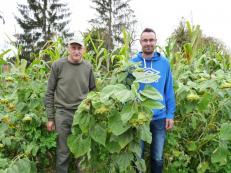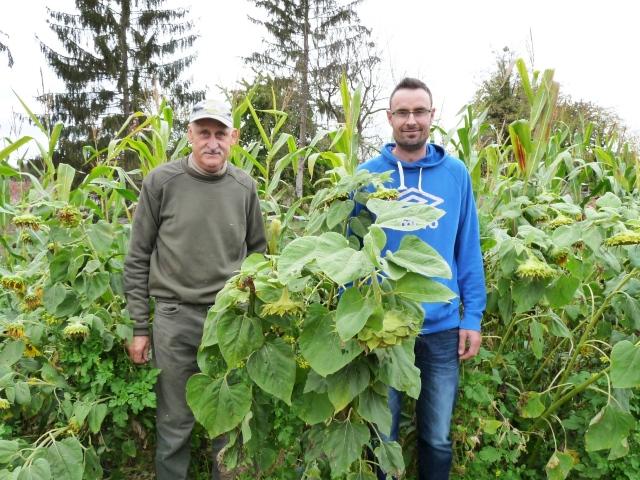
David Decker
When the soil comes back to life and we respect it? it gives back to us
Crop/Production
David Decker, grain producer, has been based in Mackenheim (Bas-Rhin) since 2013.
The SCEA DECKER farm: 100 irrigated hectares: 70% corn, 15% soybeans, 10% wheat and 5% meadows and fallow
Since 2011, 50% of the surface has been seeded with BACTERIOSOL.
Product/Usage
- Bactériosol concentré (since 2011) / To increase soil's fertility naturally.<
Testimonial
If David Decker solved his problems of soil structure by working with the SOBAC concept, his father, André, who exploited half of the exploitation using the conventional system, did not dare to take the plunge, nor change his work habits. Yet, he sees the difference and confirms his son's observations and results.

David: "I had structural problems, stagnant yields and I was moving towards a change in practices. In a meeting of the BASE Association (Biodiversity, Agronomy, Soil, Environment), I met Ken POINCELET (East Region Manager of SOBAC), who introduced me to the SOBAC concept.
I wanted to reorient my practices towards the soil and living things and no longer focus everything on minerals and chemicals. On some plots, .
We could no longer plough. So, either we bought a 200-horsepower tractor or we changed the system.
This is where I set up the first trials, on four of my worst plots without ploughing and seeding with BACTÉRIOSOL. I started in the fall of 2011 and we came back the following spring for the first field visits with the SOBAC technician.
On the BACTÉRIOSOL side, the residues were white, colonized by mushrooms with a little scent of underwood, while on the conventional side, there was no evolution, no biological activity. It was already glaring in only a few short months. The following year, I brought in BACTÉRIOSOL again and there the whole soil structure had changed.
Before, on these plots, I felt that production was slowing down at the time of stubble cultivation on the most difficult areas and since the establishment of the SOBAC ecosystem, we saw a clear evolution of the structures, much easier to work with, with a real transformation of crop residues. And then there were all these earthworms.
The very appearance of the earth had changed, the return of microbial life was obvious. For example,
I use a lot less fuel, we went from 18 to 12 liters per hectare after 8 years of BACTÉRIOSOL and we cover more surfaces in the same period of time.
It’s an undeniable saving of energy and time.
As time went by, I was able to increase the areas to be sown, notably with 36 hectares just as difficult to use, and the improvements have been confirmed again and again. " André, the father: "It is true that it surprised me.
We really saw changes. And above all, no more blue earth with bad odours, due to organic matter that rots and are useless”.
David: “In production this year, we attained new records: 44 and 50 quintals of soybeans (depending on the varieties), unprecedented, and 145 quintals on average of corn, I am really with the best of my sector, yet being in simplified farming technique. We have very heterogeneous land here, with some light plots, pebbles, and gravel, on a sand base, so even by irrigating we could not succeed. Now it fails a lot less, it is more linear, the roots are much better, the culture is therefore more autonomous.
Generally during drought, crops are much less stressed, especially since we have been experiencing very hot years lately, with real lack of precipitation. However, in corn we went from 32 mm per water turn to 25 mm and in soybeans, we can reduce by one to two water turns compared to corn. We grow less wheat, but in corn and soybean, we are very satisfied with our technical results.
Regarding disease pressures, on wheat it is very visual, the culture is really more resistant, healthier.
Today, I no longer use a regulator, one fungicide instead of two or three usually. However, we kept yields equivalent to 2018, despite the rather low regional average for wheat, we still made 70 quintals, with a single irrigation, less treatments, and less nitrogen. Regarding quality, my wheats are always well rated. In the future, on all my crops I still want to reduce nitrogen, tillage and irrigation. Ultimately, the goal would be to switch to direct sowing with full plant cover. We leave everything above the ground, and we sow in it. BACTÉRIOSOL is an ecosystem that functions on its own, if it is not disturbed or as little as possible in any case. When I see the roots of the crops and the smell of the earth, it's really encouraging.
"I work for future generations".
"In any case, we could no longer continue like this and witness, passively, the degradation of our soil. It is our whole global practice that we had to review. I have reduced nitrogen by 40 units for the second consecutive year and since I put BACTÉRIOSOL in place, I no longer bring phosphorus or potash, which saves 15 tonnes per year! I work for my sons, for future generations. My soils are swarming again with insects, earthworms. When the soil comes back to life and we respect it, it gives back to us. Someday I will harmonize the whole farm, but for now I am still working full time in an aluminium factory like other farmers in the area. However, many of my colleagues are like dad, they are afraid of changing their practices. It is true that it is quite a reassessment that it is necessary to take the step. André: "I am proud to see what my son is doing today."
Results
=> Less treatments, less nitrogen, removal of PK
=> Clear evolution of soil structure
=> Evolution of crop residues
=> Fuel saving, time saving
=> Return of microbial life
=> Better crop resistance
=> Less stress on crops
=> Regularity of crops
=> Better rooting

